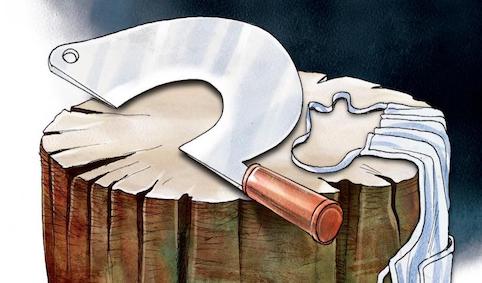The South Delhi Municipal Corporation (SDMC) passed a proposal a few days ago for something which used to be a simple fact of life all over India and especially in North India till a few decades ago – restaurants, hotels and meat shops would display prominently if the meat served or sold was “jhatka” (humane slaughter single slice) or “halal” (ritual slaughter slow slices). It was left to the customer to decide where she or he would spend their money and that is how it had been for centuries.
Jhatka was so important that it was part of pre-Partition negotiations between Sikhs and Muslims “the Sikander-Baldev Singh Pact in March 1942″ refers. The pact provided for “Jhatka meat in Government Institutions” in Pakistan but this pact fell through for multiple reasons. Jhatka was not considered an issue in India, and as a matter of simple fact, most of the butchers and meat-shops as well as restaurants serving non-vegetarian food in early post-Independence India, as were the slaughterhouses, were providing “jhatka”. I know for a fact that this was the case on my Training Ship RAJENDRA in Mumbai, when I was there between 1973-75.
All this changed around the ’70s, during and post-Emergency for multiple reasons as the term “vote bank” also became stronger, as did the demographics of the meat industry in much of North India. The slaughter houses in and around Old Delhi around that time, were shifted to the Ghazipur area near Ghaziabad – a choice of names which suggests more than history if you read up about who or what the Ghazis were. The memory of their cruelty towards parts of the world they plundered is what history books are full of. Ghazipur Abattoirs lived up to their reputation of painful deaths and soon became almost totally “halal”. The Ghazis were back, it seems.

I got involved in finding out more about this Jhatka/Halal issue quite by chance, when I was researching meat exports from India, and discovered that the fine print had somehow made “Halal Certification” at a cost into a done deal. From there, I discovered that my favourite meat shops had also all gone “Halal”, as had restaurants. In addition, pork which was and is a favourite food for me, had also gone off the menus almost everywhere other than top-end restaurants, specific meat shops and restaurants catering to food from the North-East. Even the local “Chinese”restaurants had taken pork off their menu and gone totally “Halal”.
The more I dug around, the more I realised that one specific sub-sect of one specific community had established a monopoly in meat almost all over India. To the extent that “Halal Certification” was now spreading to basic victuals like atta, rice and even cosmetics. The concept of Halal, as you may be aware, is from farm to fork in the control of a particular community. There was obviously an added risk to India’s internal and external security if all food went into Halal mode!
This had to change. So now, finally, we have the SDMC doing something about this. At the very least, we shall know what we are eating, and whether it was part of a painful religious ritual or a humane form of single slice slaughter. After all, jhatka was important enough to be part of the negotiations over Punjab, pre-Independence. About time it retained a position of prominence in present times too.
Support freedom of choice in food. Be aware of where the food came from, and if it was part of any religious rituals, which amongst other things are a risk for the security of India. You owe it to India to look before you eat.
Veeresh Malik was a seafarer. And a lot more besides. A decade in facial biometrics, which took him into the world of finance, gaming, preventive defence and money laundering before the subliminal mind management technology blew his brains out. His romance with the media endures since 1994, duly responded by Outlook, among others.
A survivor of two brain-strokes, triggered by a ship explosion in the 70s, Veeresh moved beyond fear decades ago


